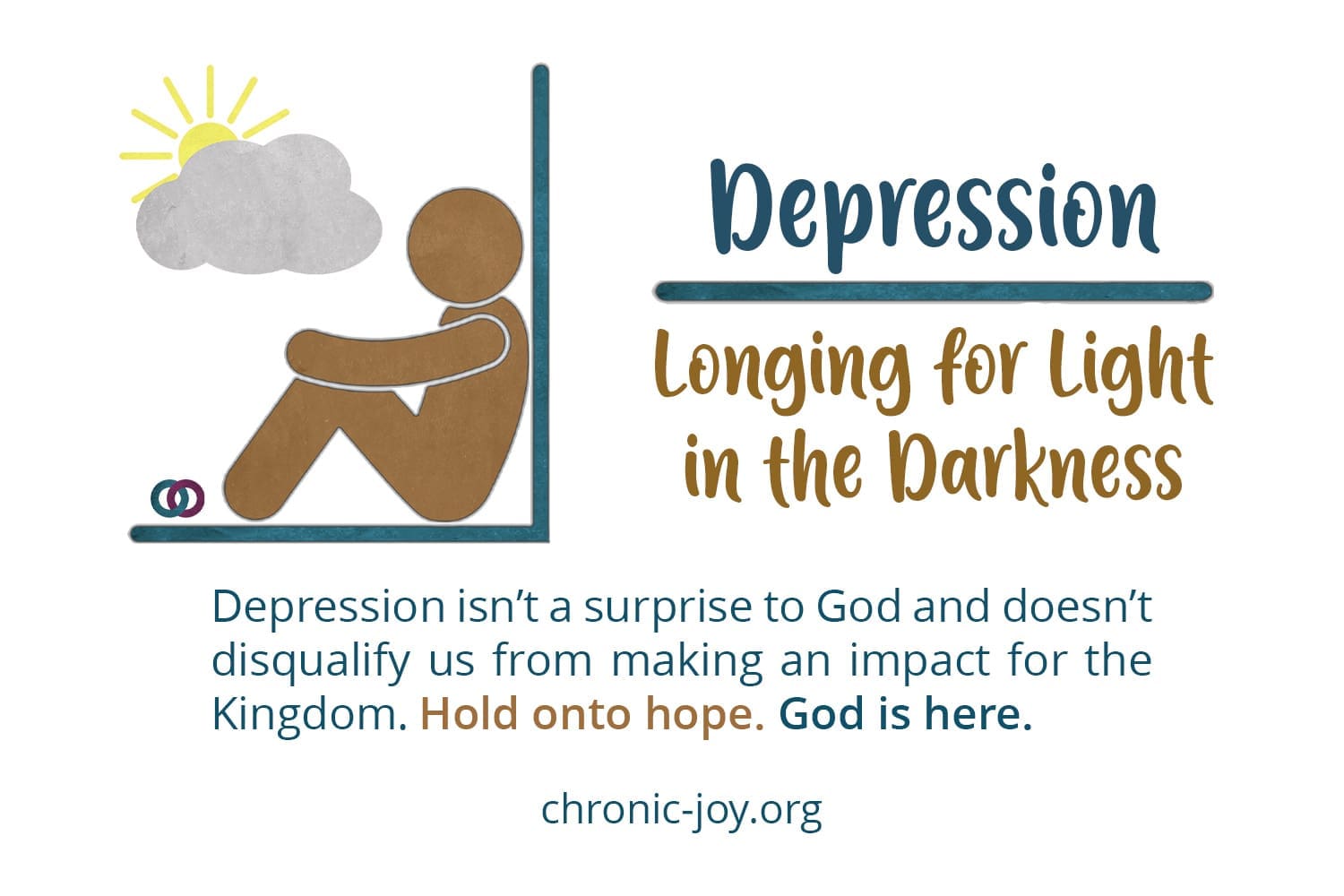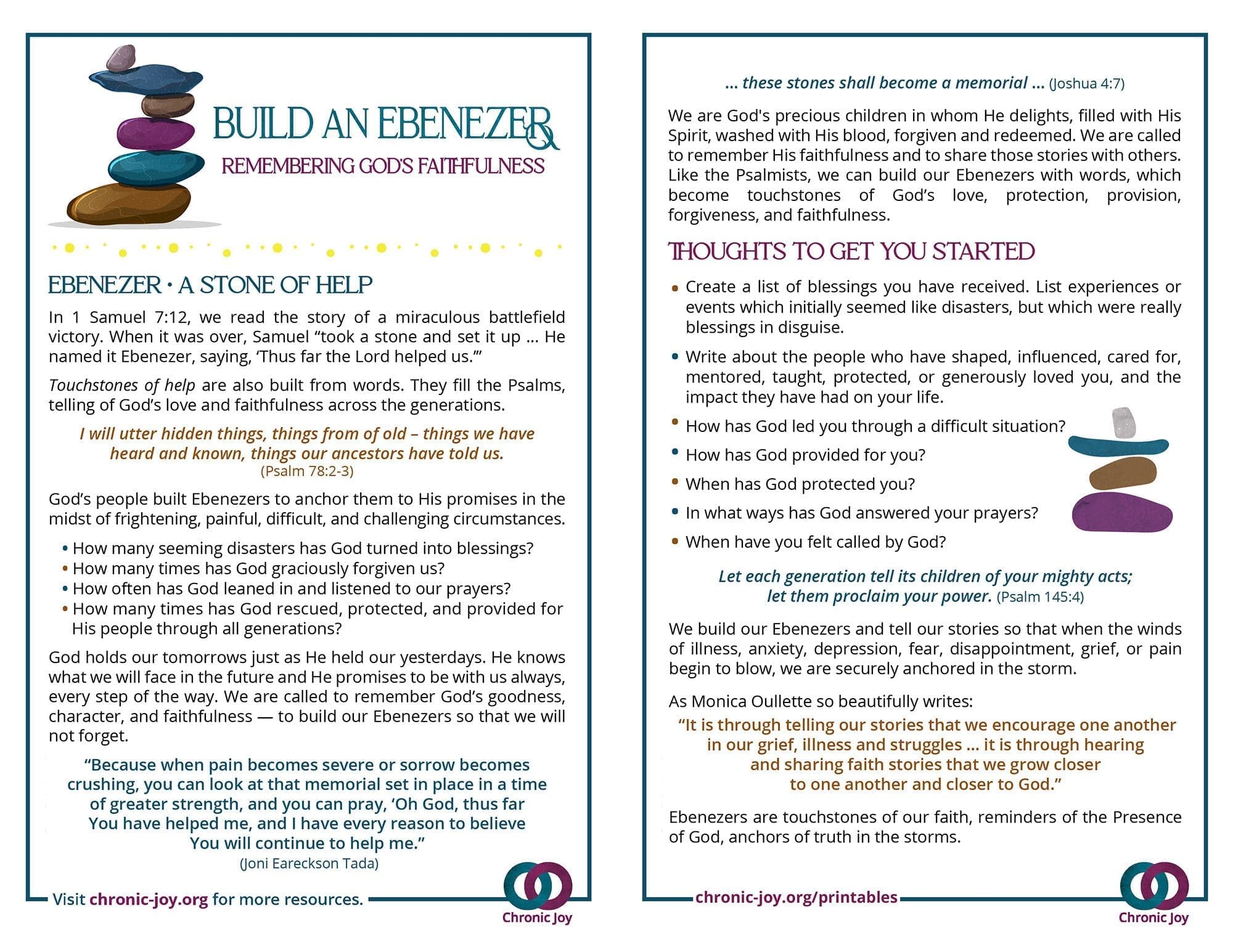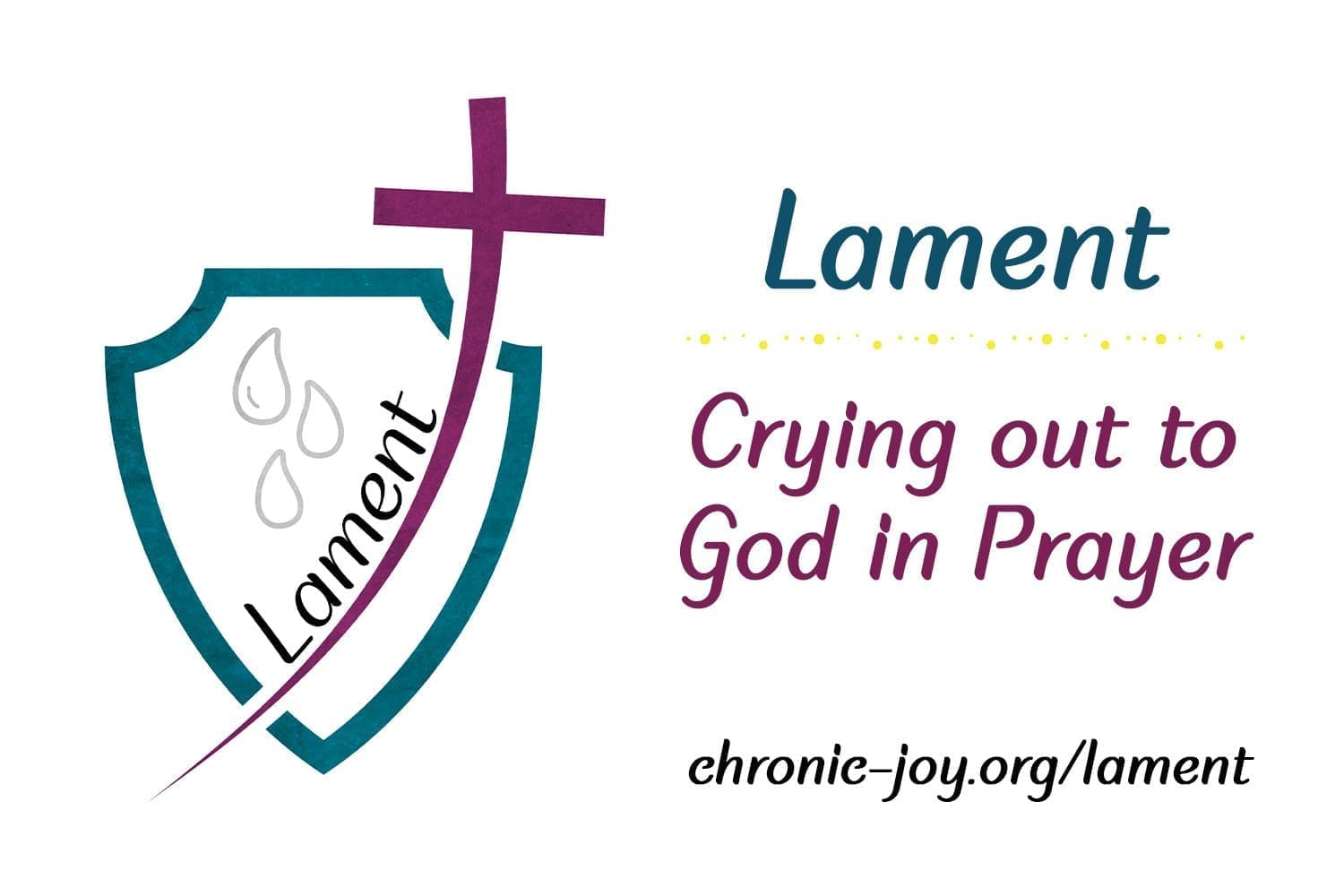
Depression Heroes of Faith
Longing for light in the darkness.
Depression isn’t a surprise to God and doesn’t disqualify us from making an impact for the Kingdom. Hold onto hope. God is here.
FREE PRINTABLE

Build An Ebenezer
Remembering God's Faithfulness
God’s people built Ebenezers, touchstones of help, to anchor them in truth in the midst of frightening, painful, difficult, or challenging circumstances.
DEPRESSION HEROES OF FAITH IN THE BIBLE
Throughout the pages of Scripture, we encounter the stories of faithful, godly men and women who struggled with depression: King David, Jeremiah, Elijah, Job, Hannah, and Naomi (to name just a few).
KING DAVID BATTLED DEEP DESPAIR
He often cried out in anguish, lamenting his sin, broken by his guilt, and grieving the loss of his sons. In Psalm 13:1-2, David cries out, How long, O Lord? Will you forget me forever? How long will you hide your face from me? How long must I wrestle with my thoughts and day after day have sorrow in my heart? How long will my enemy triumph over me?
Other times, David questions himself and leans into what he knows to be true: Why, my soul, are you downcast? Why so disturbed within me? Put your hope in God, for I will yet praise him, my Savior and my God. (Psalm 42:11)
DAVID, A MAN AFTER GOD’S OWN HEART
In 1 Samuel 13:14 and Acts 13:22, the Lord Himself called David a man after his own heart when He said, I have found David the son of Jesse, a man after mine own heart.
Notably, David was not sidelined by God or less influential for the Kingdom because he struggled with depression. In fact, David was both a man after God’s own heart and someone who suffered from depression simultaneously.
JEREMIAH WAS KNOWN AS THE WEEPING PROPHET
Jeremiah experienced intense loneliness, constant rejection, and overwhelming insecurity. Moreover, he was ridiculed and rejected by the very people he had been called to serve. He lived alone, ministered alone, and wept alone, lamenting, Why was I ever born? To watch such tragedy? To feel such sorrow? To live my days in utter shame? (Jeremiah 20:18)
In Lamentations, Jeremiah writes:
He has driven me away and made me walk in darkness rather than light;
indeed, he has turned his hand against me again and again, all day long.
He has made my skin and my flesh grow old and has broken my bones.
He has besieged me and surrounded me with bitterness and hardship.
He has made me dwell in darkness like those long dead.
He has walled me in so I cannot escape; he has weighed me down with chains.
Even when I call out or cry for help, he shuts out my prayer …
I have been deprived of peace; I have forgotten what prosperity is.
So I say, “My splendor is gone and all that I had hoped from the LORD.”
(Lamentations 3:2-8, 17-18)
GOD STILL USED JEREMIAH EVEN IN HIS DEPRESSION
Yet God said to Jeremiah, Before I formed you in the womb I knew you; before you were born I sanctified you; and I ordained you a prophet to the nations (Jeremiah 1:4-5). A few verses later, Jeremiah writes, Then the Lord put forth His hand and touched my mouth. And the Lord said to me, “Now, I have put My words in your mouth. See, I have this day set you over the nations and over the kingdoms ..” (Jeremiah 1:9-10).
Jeremiah was intensely lonely and deeply depressed, yet in the very messy midst of it all, he was powerfully used by God exactly as he was, maybe precisely because of it.
ELIJAH WAS WEARY, DISCOURAGED AND AFRAID
Queen Jezebel placed a bounty on Elijah’s head after his stunning spiritual victory. Fearing for his life, Elijah left his servant and fled 100 miles into the desert. There, he sat in the shade of a broom tree, exhausted and defeated. He mourned: I have had enough, Lord … Take my life … (1 Kings 19:4).
Elijah (this man of God) was not prevented from becoming discouraged. While he had had enough, the God who was with him on Mount Carmel and when he received the death threat was also with him under the broom tree.
GOD CARED FOR ELIJAH
All at once, an angel touched him and said, “Get up and eat.” He looked around, and there by his head was some bread baked over hot coals and a jar of water. He ate and drank and lay down again. The angel of the Lord came back a second time and touched him and said, “Get up and eat, for the journey is too much for you.” So he got up and ate and drank. (1 Kings 19:5- 8)
While the journey was too much for Elijah, he was fortified by bread and water straight from the hand of God. Accompanied by God every step of the way, Elijah journeyed for 40 days to Mount Horeb (the mountain of God). God knew exactly what Elijah needed. He knows exactly what we need as well. God did not equip Elijah beforehand but let Elijah deplete his own meager resources first. Then, when Elijah was at the absolute end of himself, he was ready to receive and be equipped to continue the journey.
JOB SUFFERED THE DEVASTATING LOSS OF ALMOST EVERYTHING
Job lost his sheep, servants, oxen, donkeys, camels, every one of his children, his home, his wealth, and his health – all but his life and his wife. Dr. Roger Barrier describes Job as a twisted mass of brokenness and grief.
In despair (having also suffered immeasurable loss), Job’s wife cries, Do you still cling to your integrity [and your faith and trust in God, without blaming Him]? Curse God and die! (Job 2:9)
JOB, A MAN OF GREAT FAITH, SINKS BENEATH THE WEIGHT OF CATASTROPHIC LOSS
Job opened his mouth and cursed the day of his birth. (Job 3:1)
Why did I not perish at birth and die as I came from the womb? (Job 3:11)
Why is light given to those in misery, and life to the bitter of soul, to those who long for death that does not come … (Job 3:20-21)
I have no peace, no quietness; I have no rest but only turmoil. (Job 3:26)
GOD HAD A BIGGER PLAN
God had a bigger plan – and He blessed the latter part of Job’s life more than the former part. In fact, he had fourteen thousand sheep, six thousand camels, a thousand yoke of oxen, and a thousand donkeys. And he also had seven sons and three daughters … he saw his children and their children to the fourth generation. (Job 42: 12-13, 16)
We can see such a small speck of God’s eternal plan. We do not know what the future holds – not even the next five minutes, the next day, or the next year. The Bible reminds us that our suffering is for such a short time: And the God of all grace, who called you to his eternal glory in Christ, after you have suffered a little while, will himself restore you and make you strong, firm, and steadfast. (1 Peter 5:10)
There is no easy way through suffering; there is no shortcut through grief or pain. Even though there might be no restoration on this side of Heaven, God always has a bigger plan. There is always more to the story – and God is always with us, present in every heartbeat, every moment, and every breath.
HANNAH WAS BARREN AND RIDICULED
Though unable to bear a child, Hannah was the wife most favored by her husband. Envious, Peninnah (the other wife) taunted Hannah year after year. Whenever Hannah went up to the house of the Lord, her rival provoked her till she wept and would not eat. (1 Samuel 1:7)
Elkanah would say to her, “Hannah, why are you weeping? Why don’t you eat? Why are you downhearted? Don’t I mean more to you than ten sons?” (1 Samuel 1:7-8)
In her deep anguish, Hannah prayed to the LORD, weeping bitterly. (1 Samuel 1:10)
GOD HEARD HANNAH’S PRAYER
In God’s time and perfect way, He moved, and Hannah gave birth to the prophet Samuel. And the Lord was gracious to Hannah; she gave birth to three sons and two daughters. Meanwhile, the boy Samuel grew up in the presence of the LORD. (1 Samuel 2:21)
Even amid her anguish, Hannah faithfully came before the Lord year after year and prayed – and in His own perfect time, in His way, and for His perfect purposes, God moved.
NAOMI’S CIRCUMSTANCES WERE TRAGIC
After losing two sons and her husband, Naomi (who genuinely loved her daughters-in-law) told Orpah and Ruth, Go back to your mothers’ homes. And may the Lord reward you for your kindness to your husbands and to me. (Ruth 1:8)
Finally, not only depressed but now bitter, Naomi said, The LORD himself has raised his fist against me. (Ruth 1:13)
Then her daughter-in-law Ruth reached out in the language of comfort, saying to Naomi, Don’t urge me to leave you or to turn back from you. Where you go, I will go, and where you stay, I will stay. Your people will be my people, and your God my God. (Ruth 1:16)
NAOMI’S SADNESS WAS OBVIOUS
When they arrived in Bethlehem, the whole town was stirred because of them, and the women exclaimed, “Can this be Naomi?” (Ruth 1:19)
“Don’t call me Naomi,” (meaning pleasant) she told them. “Call me Mara (meaning bitter) because the Almighty has made my life very bitter. I went away full, but the LORD has brought me back empty. Why call me Naomi? The LORD has afflicted me; the Almighty has brought misfortune upon me.” (Ruth 1:20-21)
Underlying Naomi’s lament is a deep trust and understanding of God. She is not resentful of God and has not turned away from Him. Quite the opposite, Naomi is moving towards God with honesty. She has returned to Bethlehem, to the people of God, and is realistically presenting what happened to her. It is in the midst of Naomi’s pain and lament that Ruth comes to know God. Vaneetha Rendall Risner
TO THINK ABOUT:
- Does it surprise you to learn that some of the great men and women of the Bible suffered from depression?
- How does knowing that affect you?
- How does that change your view of depression and mental illness?
- With whose experience do you most resonate? Why?
- Where was God in each of these stories?
- Where do you see God in your story?
DEPRESSION DID NOT NEGATE THEIR FAITH
Though the reasons for God’s precious sons’ and daughters’ depression varied, their deep and abiding faith in Him did not.
The LORD is close to the brokenhearted and saves those who are crushed in spirit. (Psalm 34:18)
MORE DEPRESSION HEROES OF FAITH IN HISTORY
“God uses broken people like you and me to rescue broken people like you and me.” (Pastor Eddie Cortes)
Like the pages of Scripture, history is also filled with the accounts of men and women of deep faith who suffered from sometimes debilitating depression.
JOHN BUNYAN
I am now a man of despair, rejected, abandoned, shut up in this iron cage from which there is no escape.
MARTIN LUTHER
I spent more than a week in death and hell. My entire body was in pain, and I still tremble. Completely abandoned by Christ, I labored under the vacillations and storms of desperation and blasphemy against God. But through the prayers of the saints, God began to have mercy on me and pulled my soul from the inferno below … I dispute much with God with great impatience, and I hold on to his promises.
JOHN CALVIN
Calvin wrote that true faith clings so fast to the inmost parts that, however it seems to be shaken or to bend this way or that, its light is never so extinguished or snuffed out that it does not at least lurk as it were beneath the ashes.
DAVID BRAINERD
On December 16, 1744, Brainerd wrote in his diary: I was so overwhelmed with dejection that I knew not how to live: I longed for death exceedingly: My soul was ‘sunk in deep waters,’ and ‘the floods’ were ready to ‘drown me’: I was so much oppressed that my soul was in a kind of horror.
CHARLES SPURGEON
Spurgeon wrote This depression comes over me whenever the Lord is preparing a larger blessing for my ministry; the cloud is black before it breaks and overshadows before it yields its deluge of mercy.
Depression has now become to me as a prophet in rough clothing, a John the Baptist, heralding the nearer coming of my Lord’s richer benison (blessing). So have far better men found it. The scouring of the vessel has fitted it for the Master’s use. Immersion in suffering has preceded the baptism of the Holy Ghost.
Fasting gives an appetite for the banquet. The Lord is revealed in the backside of the desert, while his servant keepeth the sheep and waits in solitary awe. The wilderness is the way to Canaan. The low valley leads to the towering mountain. Defeat prepares for victory. The raven is sent forth before the dove. The darkest hour of the night precedes the day-dawn.
MOTHER TERESA
In Come Be My Light, Mother Teresa wrote: With regard to the feeling of loneliness, of abandonment, of not being wanted, of darkness of the soul, it is a state well known by spiritual writers and directors of conscience. This is willed by God in order to attach us to Him alone, an antidote to our external activities, and also, like temptation, a way of keeping us humble in the midst of applause, publicity, praises, appreciation, etc., and success.
DEPRESSION DID NOT NEGATE THE MINISTRY OF THESE HEROES OF FAITH
It did not change these heroes of faith’s impact on the world or God’s call on their lives. Depression was part of their stories, part of their lives, and part of their legacy to God’s people.
Depression doesn’t mean our faith is weak or that we aren’t fit for God’s Kingdom. It simply means that we, too, are affected by the Fall.
WHEN THE DARKNESS OF DEPRESSIONS DESCENDS
REMEMBER WHO YOU ARE
You are a child of the Light of the World, a masterpiece created by God for His great glory. When you cannot feel His presence, stand on the truth of those who have gone before you: King David, Ruth, Jeremiah, David Brainerd, Charles Spurgeon, and Mother Teresa – and know that despite the depression, amid the darkness (maybe even because of the anguish), God is using you and your story.
For God’s invitation is: Come to me, all you who are weary and burdened, and I will give you rest. (Matthew 11:28)
God is with us in every situation, every circumstance, every heartbeat, and every single breath. We are not alone – ever.
TERRY’S STORY
During prayer time in an adult Sunday School class taught by Terry, he asked for prayer. He had been despondent for weeks – sad, less motivated, emotionally fragile — and he longed for relief, or at least for God’s sustenance so his full-time teaching ministry wouldn’t suffer.
After the study, one lady stayed behind and asked, “Terry, have you been having your quiet time?” Terry assured her that his devotional habits had been strong in recent weeks, and that in recent days the unremitting emotional pain had started with Bible reading, prayer, and confession.
DEPRESSION AND MY TIME WITH THE LORD
“For me,” Terry told her, “there is no correlation between the onset of depression and the quality of my relationship with the Lord. I can be in the vise-grip of depression when I’m in close fellowship with the Lord, or I can be happy on days when I neglect my time with Him.”
She walked away, seeming unconvinced. While she meant well, her response exacerbated Terry’s despondency. Her solution was unrealistic and unbiblical.
A strong faith and clinical depression are not mutually exclusive.
Additional Resources
Discover meaningful ways to express the darkness and despondency hiding the light you long to see and feel. When we write our story creatively, it can provide insights and hope that we may have otherwise missed.

In the Midst of Grief
(Navigating loss, suffering, pain, and sorrow.)
Grief is no stranger to those of us affected by chronic illness, pain, and suffering. While there are no rules for grieving chronic loss, there is a road map, and fellow travelers are ahead and behind us on the journey. Grief often precedes growth.

Lament
Pushing our pain aside, hiding it, or feeling shame because of it diminishes our human experience. If Jesus wept and cried out in anguish, why do we feel it is somehow faithless to honestly express lament?

Allegory • UNLOCKING THE DEEPER STORY
Allegory is a beautiful, artistic form of storytelling. Explore your story's difficult, painful, or vulnerable parts from a safer distance and a different perspective.
